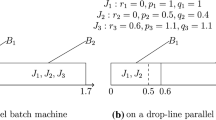Abstract
This paper considers competitive project scheduling on two unbounded parallel batch machines. There are two competing firms, and each firm has an unbounded parallel batch machine. All projects must be performed in batches by Firms 1 and 2 on their machines, respectively. The profit that each firm obtains from each project depends on whether the firm finishes the job before or after its competitor. In the first problem, given a feasible schedule for Firm 1, the objective is to find an optimal schedule to maximize the total reward for Firm 2 under the given schedule for Firm 1. The corresponding total reward for Firm 1 is called the worst-case total reward of the given schedule for Firm 1. In the second problem, the objective is to find an optimal schedule for Firm 1 to maximize the worst-case total reward. We provide optimal algorithms for the two problems, respectively.
Similar content being viewed by others
References
Averbakh, I., Lebedev, V.: Project scheduling under competition. Nav. Res. Logist. 52, 481–492 (2005)
Agnetis, A., Mirchandani, P.B., Pacciarelli, D., Pacifici, A.: Scheduling problems with two competing agents. Oper. Res. 52, 229–242 (2004)
Leung, J.Y.T., Pinedo, M., Wan, G.: Competitive two-agent scheduling and its applications. Oper. Res. 58, 458–469 (2010)
Perez-Gonzalez, P., Framinan, J.M.: A common framework and taxonomy for multicriteria scheduling problems with interfering and competing jobs: multi-agent scheduling problems. Eur. J. Oper. Res. 235, 1–16 (2014)
Agnetis, A., Billaut, J.C., Gawiejnowicz, S., Pacciarelli, D., Soukhal, A.: Multiagent Scheduling—Models and Algorithms. Springer, Berlin (2014)
Averbakh, I.: Nash equilibria in competitive project scheduling. Eur. J. Oper. Res. 205, 552–556 (2010)
Lee, C.-Y., Uzsoy, R., Martin-Vega, L.A.: Efficient algorithms for scheduling semiconductor burn-in operations. Oper. Res. 40, 764–775 (1992)
Brucker, P., Gladky, A., Hoogeveen, H., Kovalyov, M.Y., Potts, C.N., van de Velde, S.L.: Scheduling a batching machine. J. Sched. 1, 31–54 (1998)
Mönch, L., Fowler, J.W., Dauzre-Prs, S., Mason, S.J., Rose, O.: A survey of problems, solution techniques, and future challenges in scheduling semiconductor manufacturing operations. J. Sched. 14, 583–599 (2011)
Tian, J., Fu, R.Y., Yuan, J.J.: Online over time scheduling on parallel-batch machines: a survey. J. Oper. Res. Soc. China 2, 445–454 (2014)
Author information
Authors and Affiliations
Corresponding author
Additional information
This research was supported in part by the National Natural Science Foundation of China (Nos. 11771406, 11571321 and U1504103).
Rights and permissions
About this article
Cite this article
Lu, LF., Zhang, LQ. Competitive Project Scheduling on Two Unbounded Parallel Batch Machines. J. Oper. Res. Soc. China 6, 473–483 (2018). https://doi.org/10.1007/s40305-017-0180-4
Received:
Revised:
Accepted:
Published:
Issue Date:
DOI: https://doi.org/10.1007/s40305-017-0180-4



